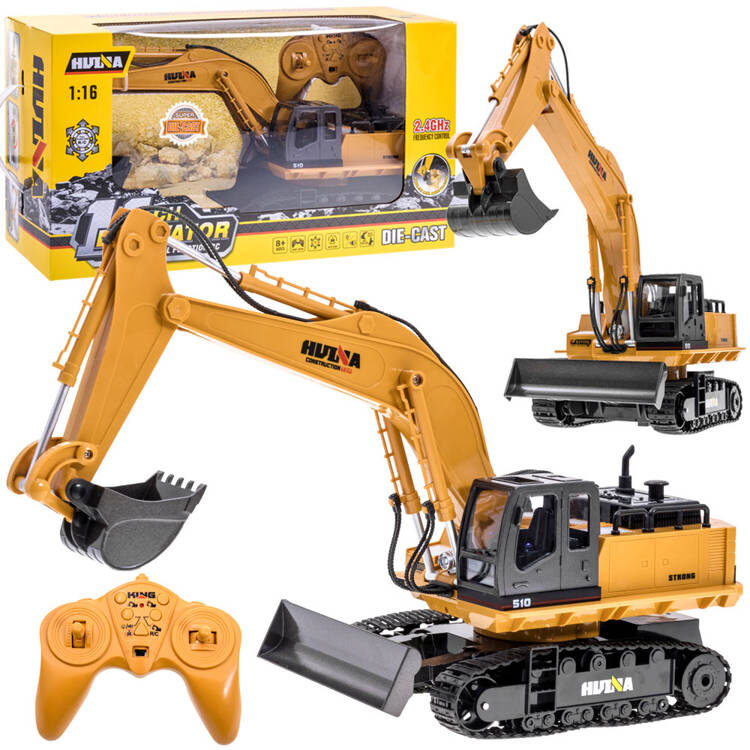Recognizing How Excavator Works and Its Effect On Performance
Excavators play an essential duty in building and construction and mining procedures, depending on a complex interaction of hydraulic and mechanical systems. Their capability to perform a range of tasks pivots on both their layout and the innovation integrated within. Understanding these parts can considerably affect operational performance and efficiency. As developments remain to improve the industry, one have to think about just how these adjustments will certainly influence future techniques and efficiency.
The Basics of Excavator Mechanics

The Role of Hydraulic Equipments in Excavators
At the heart of excavator operation lies the hydraulic system, which plays a crucial function in powering the equipment's activities and features. This system utilizes pressurized hydraulic fluid to transfer power, enabling various activities such as digging, lifting, and moving. By using the principles of hydraulics, excavators can carry out jobs with impressive precision and force, enhancing general functional efficiency.The hydraulic system contains key elements, including cylinders, pumps, and valves, which collaborate to manage the circulation and instructions of the fluid. When the operator involves the controls, the hydraulic liquid is routed to certain cylinders, translating the operator's commands right into physical activity. This device permits smooth and responsive actions, which are important in building and excavation atmospheres. double e volvo rc excavator. The efficiency of the hydraulic system straight affects the efficiency and flexibility of the excavator, making it a crucial component in contemporary excavation processes
Key Components of an Excavator
Recognizing the key parts of an excavator is crucial for understanding how this effective equipment runs. An excavator contains several significant aspects, consisting of the undercarriage, residence, container, boom, and arm. The undercarriage gives stability and flexibility, frequently including wheels or tracks to browse numerous terrains. The house contains the engine and hydraulic systems, enabling the driver to regulate motion and power the equipment. The boom expands from your home, allowing upright reach, while the arm connects to the container, helping with excavating and lifting operations.Additionally, the taxicab houses the operator, equipped with controls for exact maneuvering. Each of these elements plays an important duty in the excavator's overall performance, adding to its effectiveness and effectiveness on building websites. Comprehending these components aids in optimizing and keeping excavator efficiency, making certain tasks are finished securely and properly.
Attachment Convenience and Its Benefits
Accessory adaptability is a vital facet of excavators, enabling operators to switch over in between various tools customized for details tasks. This versatility not just boosts work efficiency yet additionally adds to cost-effectiveness by lowering the need for multiple makers. Comprehending the different kinds of add-ons readily available can considerably affect the general performance and functionality of an excavator on job sites.
Types of Attachments
While excavators are primarily identified for their excavating capabilities, their true versatility lies in the broad range of accessories offered. These accessories boost the excavator's capability, permitting it to execute numerous jobs past excavation. Typical accessories include buckets (for digging and scooping), hydraulic thumbs (for comprehending products), and augers (for piercing openings) Grapples are utilized for moving and taking care of debris, while rippers can break up hard surface areas. Other specialized attachments, such as plates and plows, allow excavators to adjust to specific task requirements. This variety not just boosts the equipment's energy across various markets, consisting of construction, demolition, and landscape design, yet likewise allows drivers to tailor their equipment to satisfy particular task demands efficiently.
Boosted Job Efficiency
Making the most of work effectiveness is a primary benefit of utilizing different excavator add-ons. Different accessories permit an excavator to perform multiple jobs without needing to change equipment, conserving valuable time and labor. Using a hydraulic hammer can damage concrete while a bucket accessory can dig deep into soil, allowing a seamless operations. This flexibility decreases downtime connected with devices adjustments and boosts productivity on-site. In addition, specialized accessories boost accuracy in jobs such as grading or landscaping, bring about higher quality results. The capability to adjust to various job demands not just streamlines operations however additionally minimizes the requirement for added machinery, making certain that jobs are finished swiftly and efficiently. click reference In general, add-on convenience considerably adds to enhanced task effectiveness in excavation job.
Cost-Effectiveness and Flexibility
Cost-effectiveness is a significant benefit of making use of functional excavator add-ons. These accessories permit a solitary excavator to carry out numerous tasks, reducing the demand for extra equipment and labor - double e volvo rc excavator. By switching over in between containers, hammers, and grapples, drivers can deal with different projects, from excavating to demolition, consequently making the most of devices usage. This flexibility not just reduces operational prices however also decreases downtime related to altering tools. In addition, the capability to customize excavators with specialized attachments boosts efficiency, as they can effectively handle varied jobs according to project needs. In conclusion, the combination of cost-effectiveness and convenience in excavator accessories contributes to improved functional effectiveness and source allowance in building and excavation projects

Advanced Modern Technology in Modern Excavators
Modern excavators are significantly outfitted with sophisticated technology that transforms excavation procedures. Automation enhances operations, while enhanced gas performance minimizes operational costs. Furthermore, wise control systems enhance precision and safety and security, noting a considerable evolution in excavation tools.
Automation in Excavation Processes
As excavation innovation develops, automation has actually become a vital part in improving efficiency and accuracy on task websites. Modern excavators are furnished with advanced automated systems that facilitate jobs such as grading, digging, and trenching with very little operator treatment. These systems make use of sensing units, GPS, and artificial intelligence algorithms to assure exact placing and depth control, considerably reducing the margin for mistake. In addition, automation enables drivers to focus on calculated decision-making as opposed to hands-on controls, bring about boosted productivity generally. Such technologies not only enhance process yet also improve safety and security by minimizing human mistake in complex operations. Subsequently, the integration of automation in excavation processes represents a significant innovation in building and construction innovation, driving the sector in the direction of better efficiency and efficiency.
Boosted Fuel Performance
Improvements in modern technology have actually also led to substantial renovations in gas efficiency for contemporary More Help excavators. Modern equipments are geared up with advanced engines that enhance power outcome while lowering gas intake. These engines make use of innovative combustion technologies, such as turbocharging and direct fuel injection, to enhance performance and efficiency. In addition, light-weight materials in construction decrease general weight, enabling for less energy expense throughout operation. The introduction of variable speed controls enables operators to readjust engine performance according to details jobs, better minimizing gas usage. Because of this, these enhancements not just reduced operational prices however likewise add to ecological sustainability by minimizing emissions. Overall, boosted fuel performance in excavators is an essential growth that boosts productivity and financial feasibility in the construction market.
Smart Control Systems
While drivers navigate significantly complicated job websites, smart control systems in excavators have actually become essential devices for enhancing effectiveness and precision. These sophisticated technologies utilize algorithms and sensors to keep track of different specifications such as load weight, surface problems, and operational efficiency. By automatically adjusting hydraulic functions, wise systems enhance machine efficiency, leading to enhanced productivity and minimized wear on elements. Additionally, operators take advantage of user-friendly user interfaces that provide real-time comments and diagnostics, permitting notified decision-making. This integration of innovation not just enhances procedures but also lessens human mistake, contributing to safer workplace. As the building and construction market proceeds to evolve, smart control systems will play an essential role in shaping the future of excavator effectiveness and efficiency.
Enhancing Functional Efficiency With Excavators
Excavators play a necessary duty in boosting operational effectiveness throughout different construction and excavation projects. Their adaptability permits several jobs, including digging, product, and lifting handling, which simplifies operations and lowers the demand for added tools. With effective hydraulic systems, excavators can carry out durable tasks with precision, significantly decreasing the time required to complete tasks. The assimilation of sophisticated innovation, such as general practitioner and automated controls, additionally enhances their operation, enabling drivers to accomplish greater accuracy and lower product waste. Furthermore, modern excavators are made to eat less gas and decrease discharges, adding to both price financial savings and environmental sustainability. By using excavators properly, building and construction teams can improve efficiency, meet task his comment is here due dates, and improve total site administration. This multifunctionality and performance make excavators vital tools in the modern-day building landscape.
The Future of Excavators in Construction and Mining Industries
As the building and construction and mining industries advance, the future of excavators is poised for substantial improvement driven by technological advancement and changing functional demands. Breakthroughs in automation and expert system are reshaping excavator capacities, enabling improved accuracy and effectiveness in procedures. Self-governing excavators are emerging, lowering the demand for human intervention and minimizing the danger of accidents.Moreover, the integration of telematics and IoT modern technology allows real-time monitoring of device efficiency and predictive maintenance, maximizing uptime. Environmentally friendly styles, consisting of hybrid and electric designs, are obtaining traction, lining up with sustainability goals within the industry.Additionally, making use of innovative materials and lighter styles boosts fuel efficiency while keeping performance criteria. As these trends progress, excavators will play a crucial duty in fulfilling the boosting needs for performance and safety in building and construction and mining, ultimately transforming functional landscapes.
Frequently Asked Inquiries
How Do Climate Conditions Affect Excavator Efficiency?

Weather greatly influence excavator efficiency, as rainfall and mud can hinder traction and stability, while severe temperatures might affect hydraulic systems. Operators should adjust to these variables to guarantee perfect performance and security during operations.
What Precaution Should Operators Comply With While Using Excavators?
Safety and security procedures for excavator operators include using ideal personal safety devices, conducting pre-operation assessments, ensuring correct communication with ground personnel, preserving a safe distance from overhanging risks, and sticking to recognized functional protocols to stop accidents.
Exactly How Commonly Should Excavators Be Maintained for Ideal Performance?
Excavators need to be maintained routinely to guarantee peak efficiency, typically every 250 operating hours or as defined by the producer. Regular checks enhance integrity, protect against unforeseen malfunctions, and prolong the life-span of the equipment.
What Is the Typical Life-span of an Excavator?
The ordinary lifespan of an excavator usually varies from 10,000 to 15,000 hours of procedure. Factors influencing longevity include upkeep techniques, running problems, and the quality of the device itself, affecting general efficiency and efficiency.

Can Excavators Operate on Irregular Terrain Effectively?
Excavators can operate efficiently on irregular terrain as a result of their verbalized layouts and adjustable tracks. These attributes allow them to preserve stability and grip, allowing efficient procedure in challenging settings commonly come across in construction and landscaping tasks. Each of these components plays a crucial role in the excavator's general functionality, adding to its efficiency and performance on building and construction sites. Making best use of job effectiveness is a main benefit of making use of various excavator accessories. While drivers navigate increasingly complicated work websites, clever control systems in excavators have actually arised as crucial devices for boosting performance and accuracy. Excavators play a necessary function in improving operational effectiveness across various construction and excavation tasks. Breakthroughs in automation and fabricated intelligence are reshaping excavator capabilities, permitting for improved precision and efficiency in operations.
Comments on “Why the Double E Volvo rc excavator Is a Game-Changer for Efficiency and Safety”